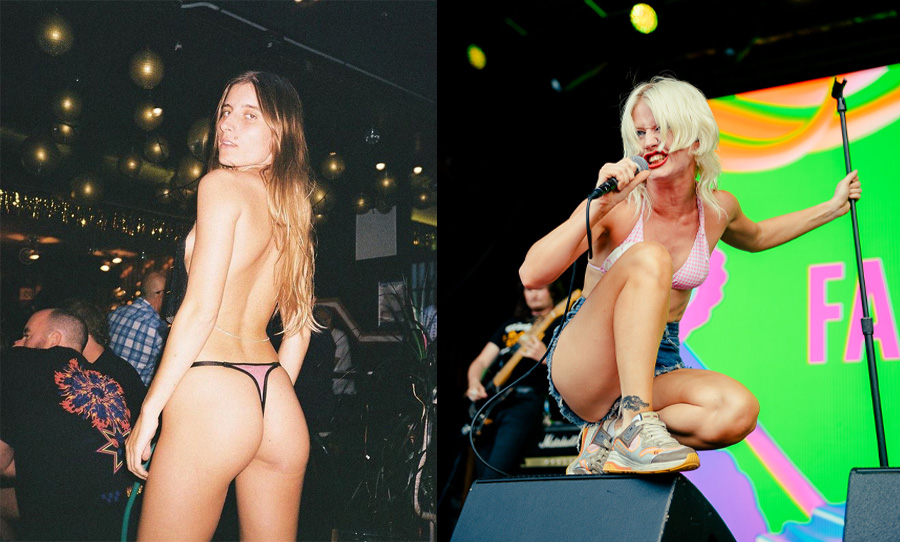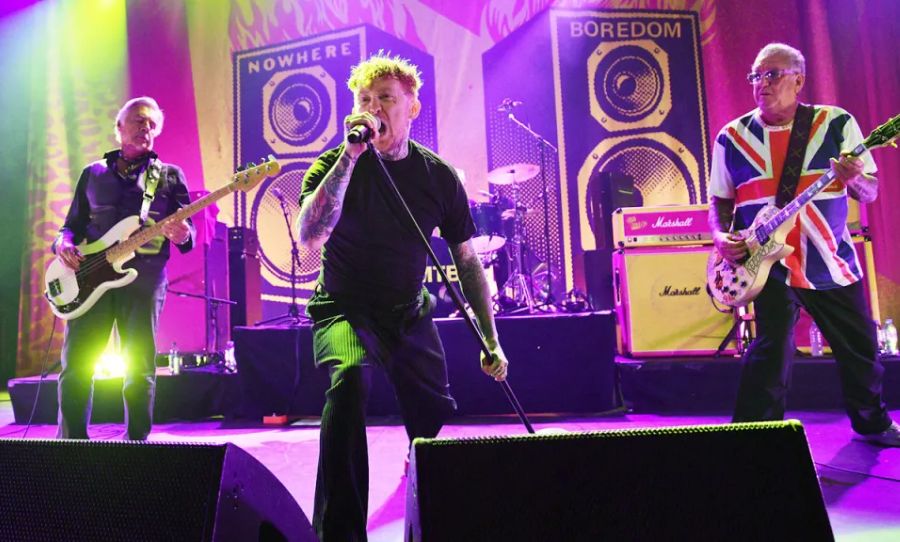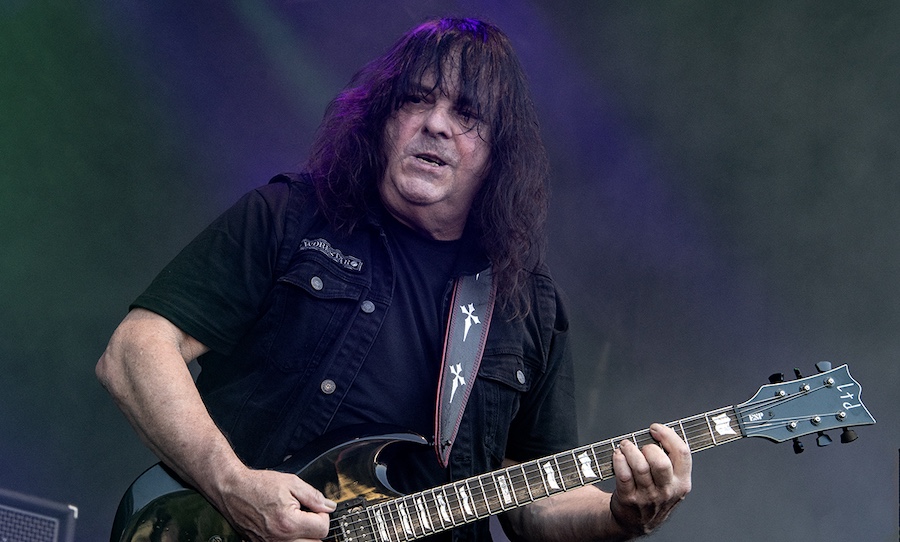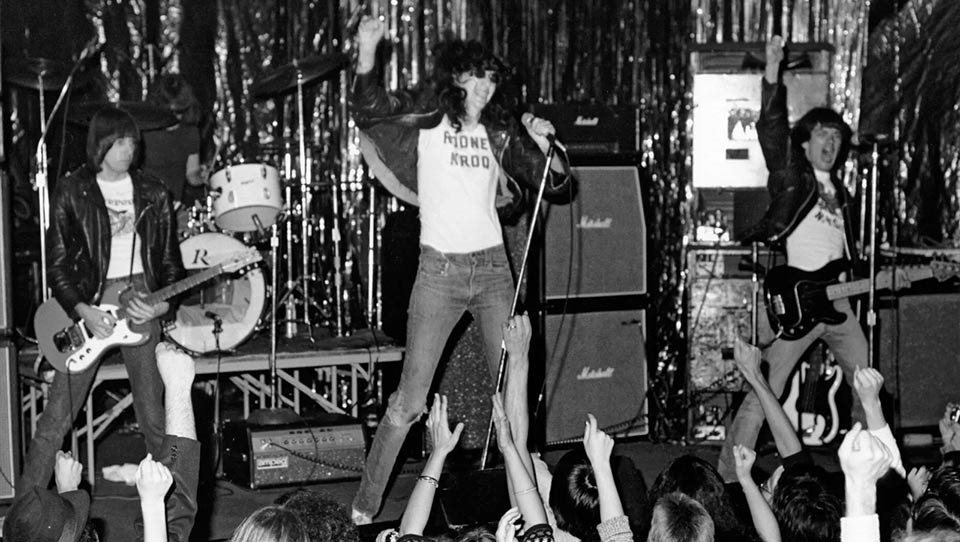Amyl and The Sniffers frontwoman Amy Taylor and author, sex worker, and activist Tilly Lawless, “two kind of grotty, gap-toothed girls from the north coast” discuss their surprising creative crossover points.
In the second half of 2021, Tilly Lawless published her book Nothing But My Body and Amyl and The Sniffers released their album Comfort To Me. Although the media are wildly different, the intersection of Tilly and Amy’s work is something that can’t be argued against.
When paired up for a conversation, Tilly and Amy entered into a discussion that covered a surprising amount of common ground. From their upbringings to the subject matter they often find themselves interrogating, it’s likely if you’re a fan of one of them, you’ll be a fan of the other.
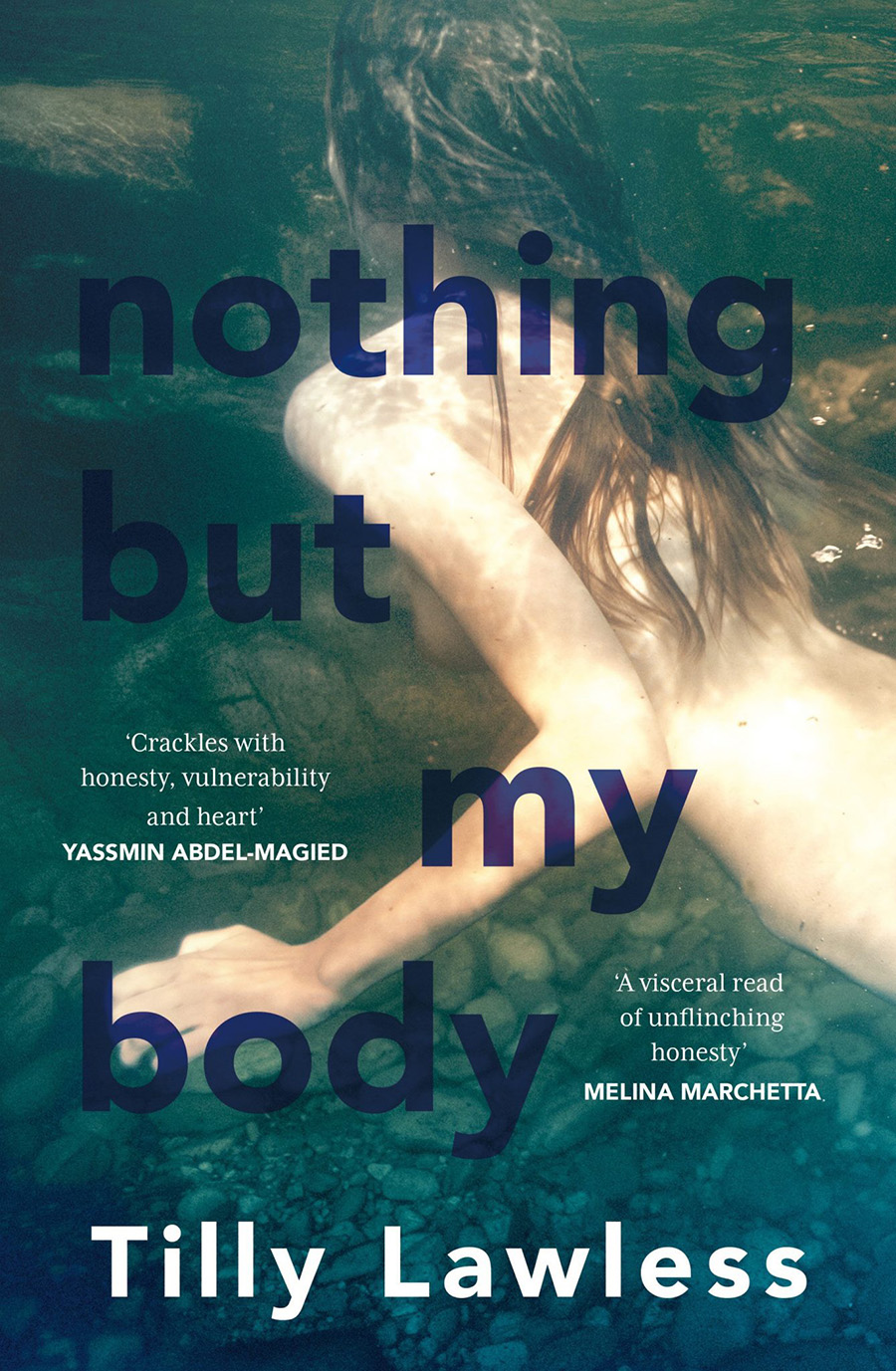
AMY: I’ve been reading your book all day!
TILLY: I love that! I’ve been listening to your album and it’s so bizarre how many things you speak about in your lyrics are things I speak about in my book.
AMY: I know! It freaked me out, I was just up to the part about the bushfires and stuff and I was like, ‘oh my god’.
TILLY: You talk about wanting to walk along the river and see the stars above you, I was like ‘this is such north coast things’.
AMY: Fuckin’ oath.
TILLY: Do you want me to start?
AMY: Why don’t you start and we’ll just roll with it.
TILLY: Ok, I literally have all these notes, like I’ve written down lyrics and things. Also, you like so many of the same artists as me, like Dolly Parton, Junglepussy… such an eclectic array.
Ok ok, one of things I wanted to speak to you about, and I feel like we probably have a similar thing with this.
So a lot of people like your work and obviously you guys are incredible, but what I’ve noticed is particularly a lot of rich kids I know really like your work, right?
What I wondered is how it feels to have people who love you as a bogan performer, but wouldn’t love you if you were just a bogan you met in the pub?
AMY: Ooh, interesting. I’ve honestly never thought about it before so I’ll have to take a second to think on it.
I don’t know, because it’s my own experience with them or whatnot.
I suppose it could be a positive thing because it’ll make them less harsh towards people they would meet at a pub down the track in general, because they’re more comfortable with it or something like that?
TILLY: Totally, you’re normalising being more working class. Because I think about that as well – people who meet me are cool with sex work because they find me relatable, where if they met maybe a more grungy sex worker they wouldn’t be.
AMY: I know what you mean. I feel like I’m kind of entry-level bogan, entry-level punk music, entry-level all that kind of thing. So you know when you have to give a dog a pill and you wrap it in ham?
TILLY: [Laughs]
AMY: Sometimes I feel like that, like I’ve got a bit of ham wrapped around me. Which makes it easier for the straight-up girls.
TILLY: You’re bringing them around to the boganism, I love that. Another thing I wanted to ask you about is… since you like Dolly Parton.
I’m someone who works creatively by myself, and I always really loved watching musicians perform as a group, because what I find really interesting is collaboration involves a level of trust and intimacy with the other people.
And so much art is created about romantic relationships, and for me one of the things I find most interesting about Dolly Parton is I Will Always Love You, like one of her most famous songs, was written by her collaborative partner Porter Wagoner.
It wasn’t written about a romantic relationship. So I wanted to ask you how it feels to have this vital relationships in your life that aren’t romantic, they’re creative.
AMY: Well the boys in the band are like family, we’ve lived together, shared rooms together, shared beds together, and it feels like pure sibling love.
Like we all really love each other but get really annoyed by each other, we won’t see each other a lot or catch up properly, but we’ll always have each other’s back in a really distant, really weird, sibling-esque kind of way.
It’s a funny dynamic though, ’cause in a way I’m the driving force or the boss or whatever, so I’m like ‘let’s practice’ or ‘let’s do this’, I’m super driven and ambitious.
So I’m always, in a way kicking them up the butt and being like ‘let’s do this’ or ‘let’s do that’. So the relationship is super work-based in lots of ways, rather than actually being like, ‘tell me about your day-to-day life and how you’re feeling’.
I’m the same reverse – realistically they love me, but there’s a lot they don’t know about me, in a way.
TILLY: Yeah, you have a separate private life for yourself.
AMY: I think as well because we lived together for so long – now we live apart – it’s almost like we’ve moved out of home for the first time.
TILLY: Like you were a family, and now you’re suddenly an adult. ‘Oh yeah, I’m no longer with my siblings.’
AMY: Yeah, exactly.
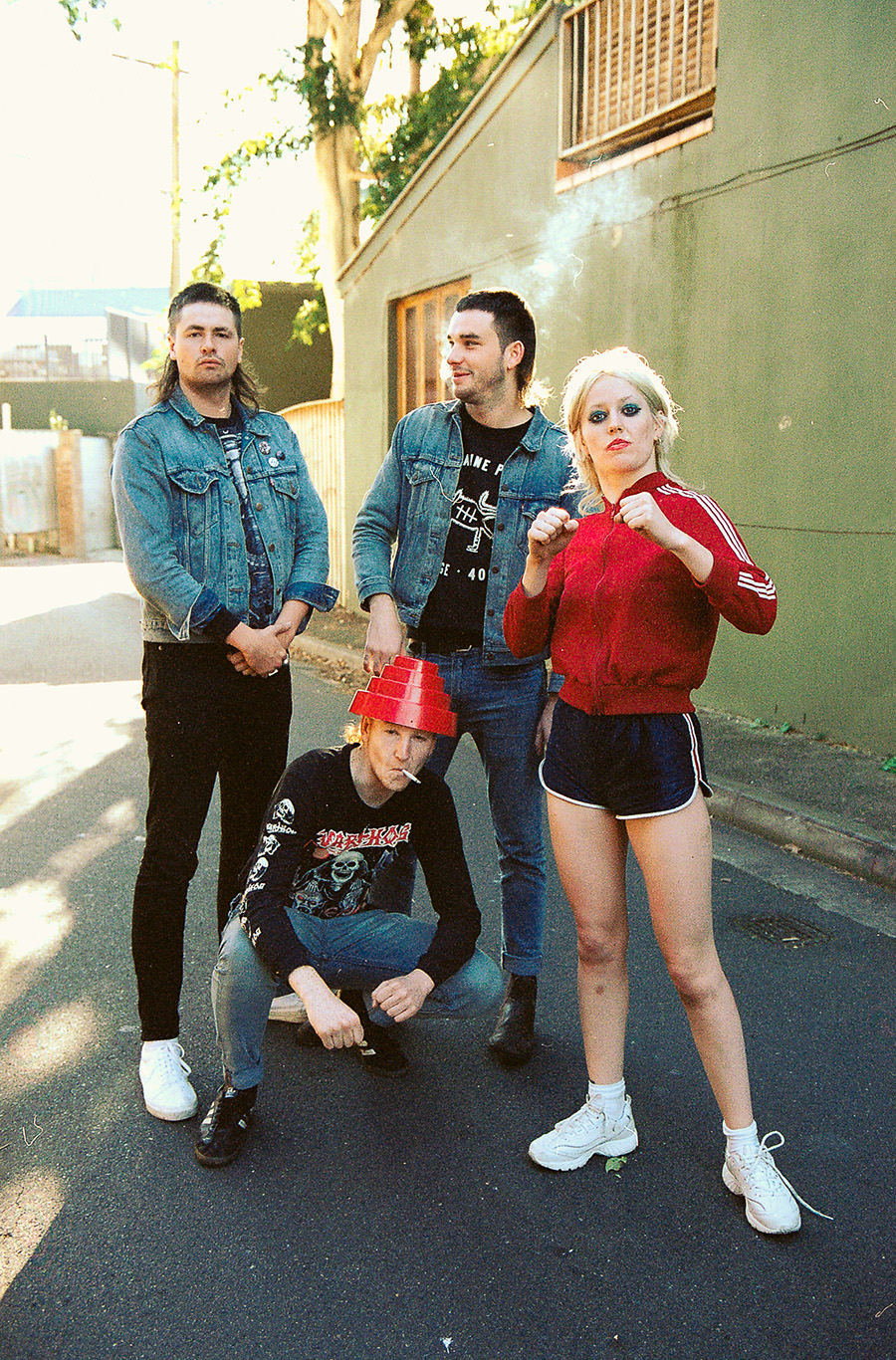
TILLY: Do you think that’s changing your creative process, now that you guys no longer live together?
AMY: Honestly I think it’s probably been good for it. ‘Cause I was the most annoying when we lived together, I was always like ‘why aren’t you writing, why are you playing PlayStation?’ I’m just like, ‘this is the sickest job in the world, why aren’t we keeping it going?’ And stuff like that.
But they’re like ‘yeah it’s dope’, but let’s just play Xbox.
TILLY: Fully, like ‘give us some downtime mum, get off our back’.
AMY: Whereas now they don’t have that hassle, because I’m preoccupied with what I do.
TILLY: I’ve just thought of this right now because you’re go, go, go with creative stuff.
I’ve always done sex work for money and then written on the side out of passion, and only in the last two years have I been doing writing more as a job, and I was really shocked to find that I could burn out and be exhausted from something I love.
Like I really didn’t realise you could get burnout from something you love. Have you experienced burnout from music, and how have you dealt with that?
AMY: Definitely! Like even today I was so flat, and I was so flat yesterday, because I’ve been so excited with the album coming out and constantly on with excitement, you know.
But the last two days were so flat, so I’ve literally been sitting in bed and eating lollies all day. So I don’t know, it’s a bizarre feeling because sometimes I can feel guilty for it.
Because I feel really lucky, like this is so dope and this is everything that feels really good, but I still feel really burnt out. And to feel burnt out by something great is really confused because it’s almost like an inverted hell, like I don’t understand what’s going on.
But I think it’s just super human to feel burnt out by anything, really.
TILLY: That was what I struggled with, because when I first felt burnt out with writing I thought, ‘wait, why am I feeling this? This is something I love, I shouldn’t be feeling it!’
And I think it’s also because, it’s weird, people talk about burnout with their general jobs that they’re doing for income, but nobody speaks about getting burnout from the thing you want to do more than anything else.
AMY: It’s weird, hey. What do you do when you get burnout with your writing?
TILLY: I just take a break from trying to create and just focus on absorbing again, you know what I mean? Just watching movies, reading books, and eventually – I guess it’s kind of like recharging – I will be inspired again.
‘Cause sometimes it’s when you least expect it, it’s like you’re reading something and ‘oh right!’, I want to do something about this.
AMY: Definitely, because you feel like an output machine constantly, like only output, opening mouth, running, whatever. But once you start inputting again it’s like you can level up, pull it up, and get your energy back.
TILLY: That’s why I found it so interesting seeing all the different artists you listen to. I find the same with reading, you have to consume so many different genres because you never know what random thing is going to tick off something in you that makes you… yeah.
AMY: Leaning into listening to stuff I really hate I find beneficial as well, because I’m like ‘oh I don’t want to sound like that, which means I want to sound like this’, or ‘I don’t want to make that genre of music, I want to make this one’. It’s making sure I speak about this, or whatnot, what I want to avoid.
TILLY: Also sometimes you see someone talk about or sing about a topic you find interesting, and it’s like, the way they’ve done that is so bad but I really like the topic. You’re like, ‘I feel like I can do this in a better way’.
AMY: Back to the burnout thing, under capitalism or consumerism or whatever, no matter what you do as a writer, musician, whatever, even though it’s a creative role it’s still part of that. It is still a job, if we boil it down. I don’t know, what do you think about that actually?
TILLY: I feel like we do look upon creative stuff like a job in that it’s all about output. I was speaking to a friend of mine who’s a choreographer, and I’m working on a third book at the moment, and I was telling her I was really frustrated with myself that I couldn’t write in lockdown.
I know I have it all in my mind, but I just can’t do it. And she was like, “Tilly, you’re forgetting about the chrysalis stage”, where you just need to let something brew, and give it time, and just let those thoughts be there, and don’t push to create yet.
And I think that’s the thing we get wrong with creativity under capitalism is that we have these deadlines and everything’s ‘now now now’, and we have that fear of other people coming up, or our moment disappearing, stuff like that.
And it’s just so important with art to sometimes just have those lulls, just letting your mind work away. I feel like a lot of us probably had that in lockdown last year.
AMY: Literally just going along in time, experiencing stuff. I guess it’s like if you have a cup of tea, you can’t go straight from pouring the boiling water in to drinking it – you had to let it brew.
TILLY: That’s such a perfect metaphor, I’m going to take that. I will credit you.
AMY: Because I’ve been reading your book – someone lent it to me and I’ve just been smashing it. You seem super self-aware and have this ability to question yourself, and question the things around you, and be critical of things in a curious way.
Is that something you’ve always had, or something you’ve worked on? Or something you’ve learned through something?
TILLY: Someone asked me this the other day and I find it so interesting, because self-awareness, is that something that people just have?
Is it a personality aspect, you know? Could we even say it comes from our star signs – I don’t know? Or is being self-aware a practice, like a filter that we put over the world, to interpret it?
My dad was quite a hippy and a very sensitive person, and always told me to be considerate of the people around me, so I think that partly made me really always conscious of the social situations around me and how I might be making people feel.
But I think also doing sex work – like I’ve done sex work for eight years now – I think interacting with so many different people that I wouldn’t normally meet, who maybe if I met in a social scenario I wouldn’t talk to or wouldn’t get along with, and then seeing their vulnerabilities… like having a man who’s said he hates gay marriage and doesn’t want the gays to marry cry on my shoulder about his wife cheating on him.
Things like that have made me see the vulnerability in people that I wouldn’t normally be sympathetic to, so I think that’s made me be so aware of… I think also maybe periods of being mentally ill, I feel like sometimes when you’re going through a really rough mentally ill period, the ironic thing about it is even if hate yourself, you’re still kind of self-absorbed.
Like you can go to a party, and you leave the party and you’re like ‘everyone hated me, I wasn’t funny enough, I wasn’t this, I wasn’t that, blah blah blah’. And the reality is no one else is actually thinking about you.
They’ve all got their own stuff going on in their head! I think coming out of periods like that and saying to friends ‘oh I was so anxious at their party’ and they’re like ‘I was so anxious too’, so it’s just… there’s always so many things going on beyond just myself.
AMY: So that part of you that has the ability to turn up the positive in people, or where their underdevelopments are, and in turn that would make you more compassionate, and in turn it’d make you question the world in a different kind of way.
TILLY: Yeah. I think you can get insight from anyone and I don’t know, I think generally people are – maybe this is too hippy of me – but I think generally people are good, you know?
You can learn things from people you don’t expect to learn things from, so I’m not about to be like ‘oh this person has a different view from me, I can’t have anything to do with them’, I’m like, ‘where can we learn things from each other and meet in the middle?’
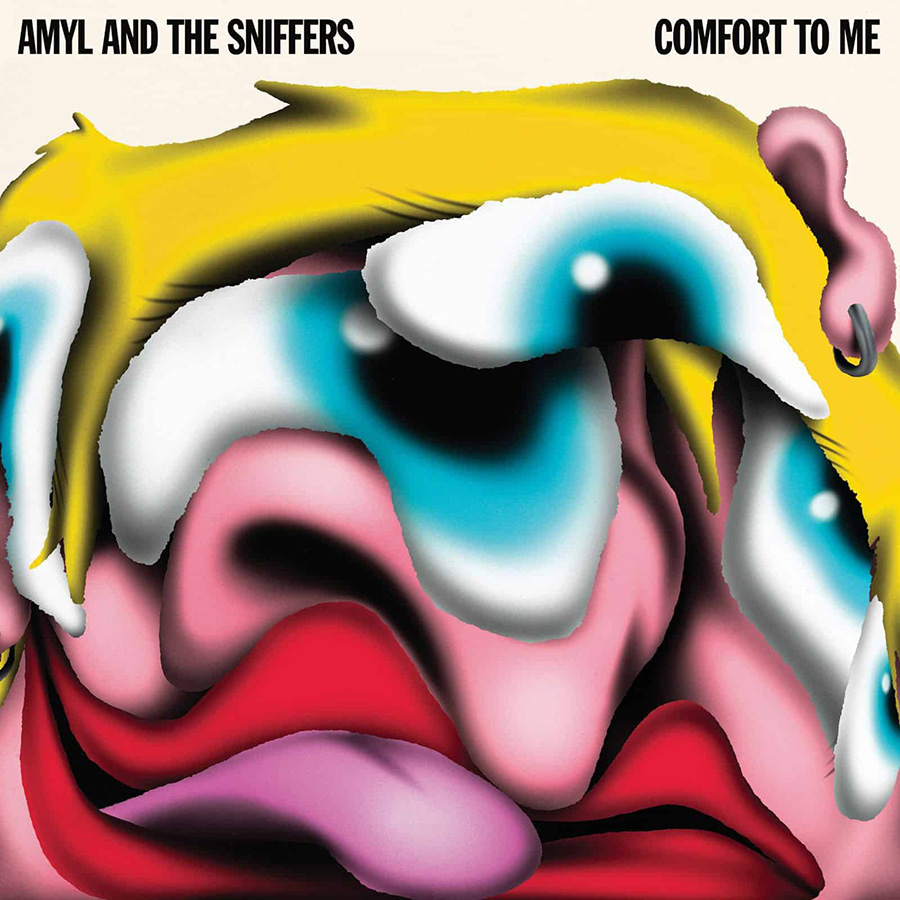
AMY: That’s dope. What books have you been reading lately?
TILLY: I’m actually rereading – very slowly – The Pickwick Papers by Charles Dickens which is from the 1800s and is really funny, but I can’t read more than two chapters in a day, I’ve had enough.
I think because all his books were serialised at the time, so each week in a magazine one chapter would come out.
People would read it like that, so I feel like each chapter is so full of stuff, but it’s really hard to read as one continuous thing.
Interestingly he came up with the concept of the cliffhanger, because when you were doing serialised books, you had to make sure somebody was going to buy the magazine the next week.
And he ended a chapter with someone hanging off a cliff, like a literal cliffhanger to get everyone to buy it!
AMY: That’s sick! That’s such a great fact. I never really read book before 2020 because I just passed it off in my mind as something I wouldn’t be interested in, and my dad was always anti-books and stuff.
And over the last year I’ve just found so much joy in them, it’s like escapism but in a way where your mind is stimulated and feels like it’s getting juicier, but yeah also… I don’t know, you can travel and you can experience so much through a book, which is really obvious to so many people but it’s new to me.
TILLY: I mean it’s a great thing to learn. And that’s so interesting to me because I see you as a writer, maybe you don’t call yourself a writer but writing lyrics to me is another form of writing.
Part of the reason I really love the fact that we’re doing this interview is so often I get paired up with other writers – as in writers who just write on a page – and I think there’s actually so much crossover between different kinds of artists.
Like drag performers, and singers, and authors, and all that kind of stuff – we have a lot to learn from each other and teach each other, do you know what I mean?
AMY: Yeah, I agree, definitely. Even reading your book or whatever, there’s so many similarities in the way we’re thinking, or our upbringing as you know, people on the east coast of Australia.
TILLY: Oh my god, I loved your Snakes song so much. Like “snakes in the chook pen”, all that stuff about the verandah!
And every time you mention being a feral, I was like, we’re actually just two kind of grotty, gap-toothed girls from the north coast, aren’t we?
AMY: Literally. I’m really enjoying it.
TILLY: It’s so interesting, I’ve written down so many of your lyrics that had just this complete crossover with things I’ve written. Like your song Maggots, I’ve written about love being an infestation in my book as well.
This is so interesting that we’re having this same imagery. Also when you say “energy is my currency” – I speak at some point about the ‘cha-ching’ of my pussy and the cash that comes from my pussy being it’s own kind of art, and I feel like… it’s so interesting thinking about you as a writer and you as a performer.
And sex work… sex work is a performance-based job. I only have an audience of one, but it’s still a fucking performance.
AMY: Fuckin’ oath.
TILLY: I find in sex work I have to respond to the energy of what the client gives out. How do you find you adapt your live performances according to the energy the crowd is giving out at the time?
AMY: For me when the crowd is high energy, obviously that’s a lot to feed off, but almost in a way it’s like if the crowd is lulling, I want to lift my energy more and lift my performance more to get them going.
Because my favourite kind of shows to attend were always the ones when the crowd was rowdy and the crowd was sweaty, and everyone was pushing each other and sweating and that.
So when I look out to the crowd and either they don’t have much energy or I haven’t won them over, it almost makes me more determined to make somebody leave with a broken wrist or something.
TILLY: Totally!
AMY: If the audience is rowdy, it feels less of a performance and more like something we’re just enjoying together. Like if the boys are playing the music I wanna dance anyway, and then if everyone’s doing it in the audience, it feels like something we’re just sharing or whatever.
TILLY: Exactly.
AMY: When you’re at a festival and it’s kind of more of a conservative audience or whatnot, and by the end of there’s at least two people like “yiew!” you’re like, fuck yeah.
TILLY: Did you go to doofs as well growing up?
AMY: Not really, I remember I went to one or two doofs up around the Mullumbimby area and would have a little boogie, but I never really got into them.
TILLY: I saw that you said you preferred concerts, which I thought was so interesting because for me around Bellingen, it was just all doofs.
AMY: Most of the parties or whatever, like most of the underage drinking was bush doofs and all the parties were doofs, there weren’t really house parties.
But I just started going to all-ages punk shows when I was 14 or something, and was like ‘this is the best thing ever’, and just hit that as well constantly.
TILLY: Was it goon as well, at the punk shows?
AMY: Goon? Yeah, there was goon.
TILLY: Yeah, we were drinking the same stuff.
AMY: But there was heaps of straight edge people, but you know, they’re still probably still hitting the goon. Everybody comes back around.
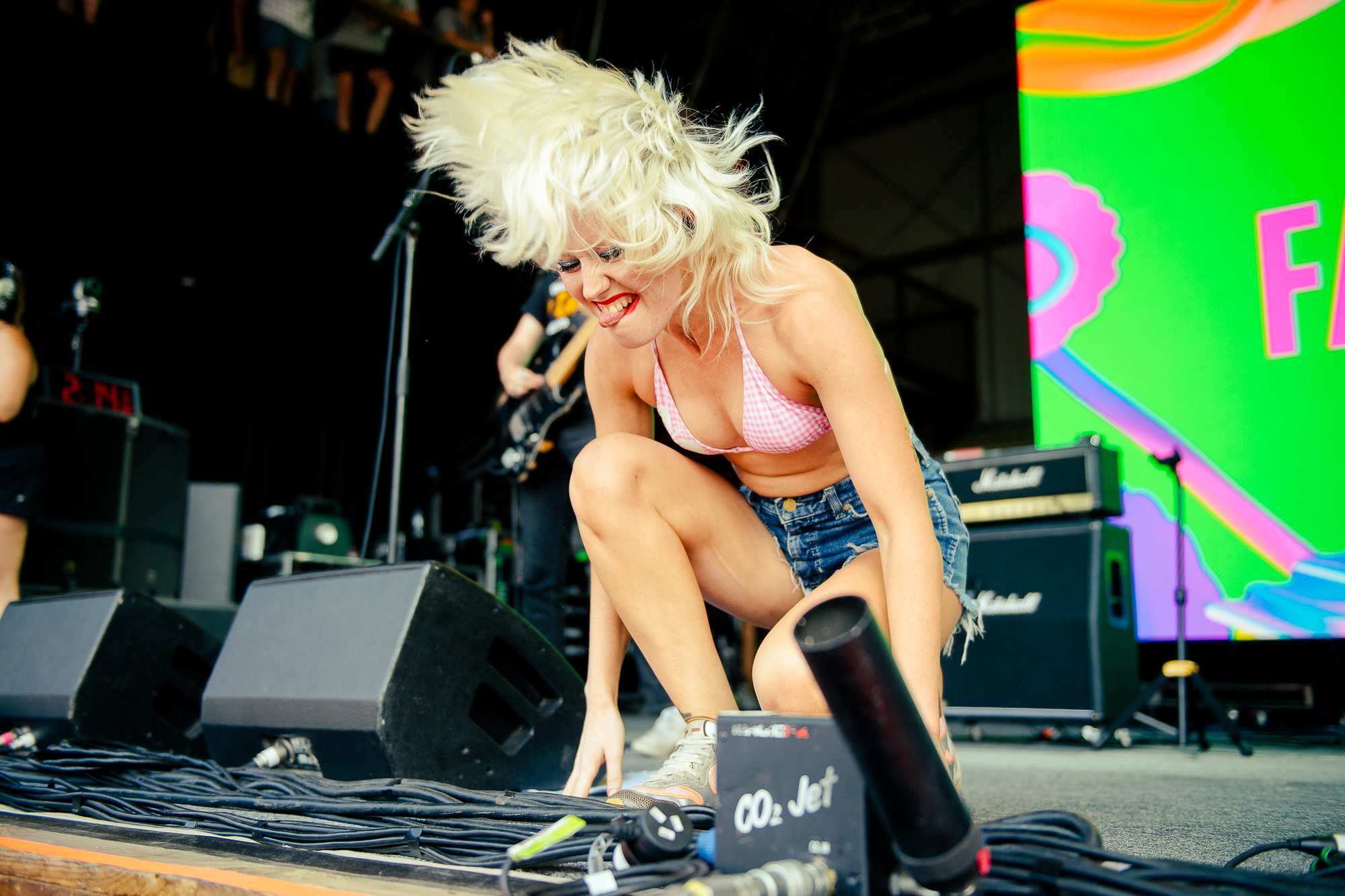
TILLY: It’s a good staple. Actually speaking about drinking… one of the lyrics I liked was “I’m still a good girl even if I’m cooked”.
I think a lot about this idea of good girl and bad girl and I deliberately wrote a lot about drugs in my book, firstly because I think it’s important to just be open about drug use, I think part of the problem we have around harm reduction is that a lot of people pretend they don’t do drugs, like celebrities and things.
But also because I find that men can be so drug fucked and create art and be seen as a legitimate, incredible artist, but as soon as a woman begins behaving in that way… women are held to a different standard of behaviour when they take drugs.
That’s why I really like that lyric, because who even defines what a good girl or a bad girl is? Women should be allowed to be as dirty and grotty as men – I always pee in men’s urinals and when people are like ‘that’s weird’ I’m like ‘well guys are allowed to pee standing up, how come I’m not allowed to?’
So do you find people hold you to a different standard than your male musician friends or the guys in your band?
AMY: I think definitely. I really like being feminine, I like makeup, I like having my ass hanging out, I like wearing bikini tops, and that makes a lot of people uncomfortable or makes people go… like I’ve had people say “they only sold tickets because she wears short shorts” or “it’s a shame she can’t sing but at least she’s got those outfits”, or like “I don’t like female singers but you had good dance moves”, and stuff like that.
Throughout my whole music life, and just regular life, there’s always been double standards.
There’s always been… also in general just being a musician, you’re really one-dimensionalised in front of people, it’s really hard to show that I’m a full circle of a human. I do all these different things, I feel all these different things, sometimes I party really hard, other times I don’t drink for weeks.
It’s really not one or the other.
It’s almost like male musicians, it’s kind of idolised to be fucked up all the time or to be doing as many drugs as you can, but as a female musician not only is it judged differently, but it’s also just straight up dangerous.
‘Cause the music industry is so male-dominated, if I’m touring relentlessly and stuff, most of the green room is 80% male or more, it’s honestly like… I’m tiny.
Even though I’m pretty tough and can handle my own, if I’m fucked every night in foreign countries or just don’t know where I am, I actually just don’t feel safe.
I think that’s a big difference, whereas say if a bandmate of mine was paraplegic-ly munted they would just be fine. But there’s a strong chance I wouldn’t be, and that’s how I feel.
TILLY: I actually get you so much with that. Sometimes when guy friends are like ‘why do you have to book in advance for somewhere you’re staying overseas?’, well it’s like I can’t just show up in a town and find someplace to stay at.
I’m not going to be safe, I’m a woman! I so get you. I don’t take drugs at work and one of the reasons I don’t is because I’m always aware of the fact that I’m a woman alone in a room with a man that I don’t know. I fully, fully get that.
AMY: I wanted to say that I really love that towards the start of your book, I’m only about 100 pages in, but you mention that on Instagram, you mention something like if you stop posting certain things, your words lose their traction.
I just wanted to say I really like that, because I feel like my body is just as much of a tool as my brain, that I can use it as a vessel to get my words or my lyrics or my thoughts listened to by a broader audience.
Because when you decide you don’t want to do that anymore, or if we age or whatever, it’s so bizarre to think that people will respect your words less.
TILLY: It’s actually what you were saying earlier about giving a dog a treat but having it wrapped in a piece of meat, it’s like you have to put the meat of your body out there to get people to listen to your words.
AMY: Yeah, straight up.
TILLY: It ties to what you said earlier, I think it’s so funny that people say to you “oh I don’t come to hear her sing, I just like to see her dress in those skimpy clothes”, it’s like you can go anywhere and see a chick dressed in skimpy clothes!
You can go to the beach and see a girl in skimpy clothes for free! So if they’re paying for a concert just to see you in skimpy clothes, it’s like, why?
AMY: It’s ridiculous.
TILLY: Anyway, it was so lovely to chat to you.
AMY: Nice to chat to ya! If you ever come to Melbourne, hit us up.
Nothing But My Body by Tilly Lawless is out now via Allen & Unwin.
Comfort To Me by Amyl and The Sniffers is out now via B2B Records.
